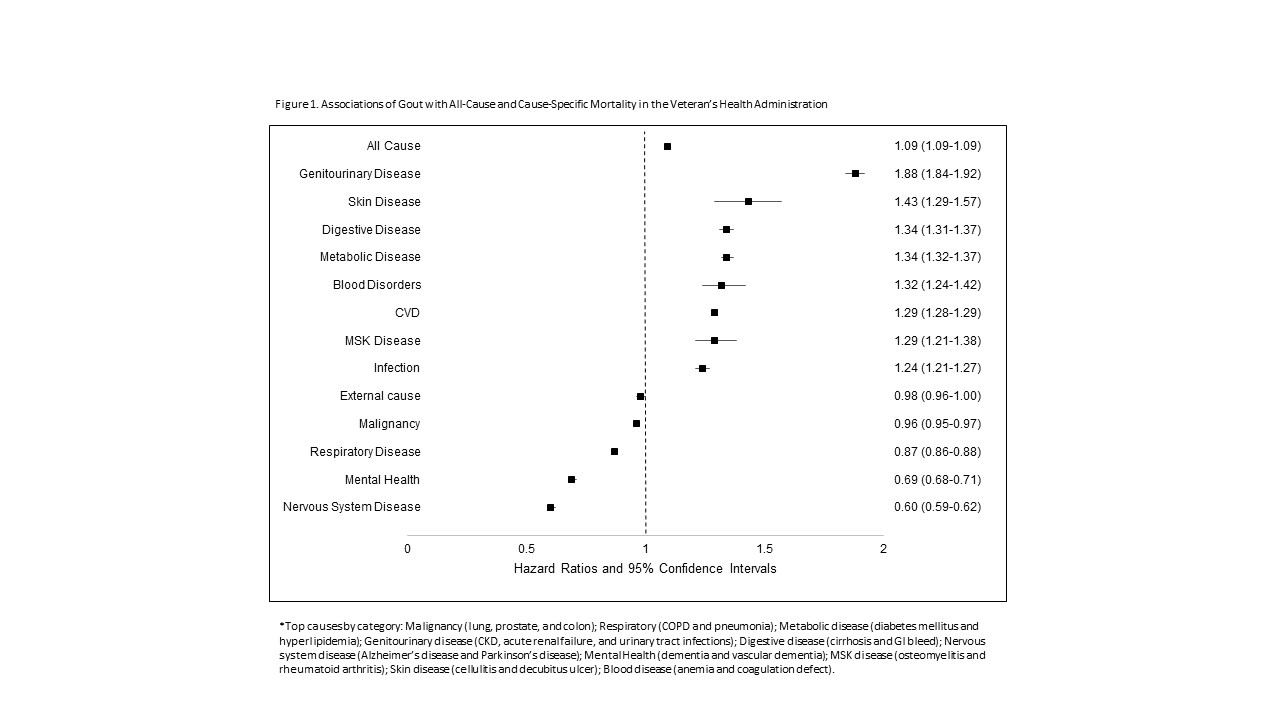Session Information
Session Type: Poster Session B
Session Time: 9:00AM-11:00AM
Background/Purpose: Gout is the most common type of inflammatory arthritis, with a prevalence in the Veteran’s Health Administration (VHA) of nearly 6%. While gout flares prompt patients to seek medical attention, the longer-term consequences of gout are important considerations for patients, clinicians, and health systems. Associated with increased all-cause mortality, an understanding of the cause-specific mortality risk in gout remains incomplete. The purpose of this study was to compare all-cause and cause-specific mortality risk between gout and non-gout patients in the VHA.
Methods: We performed a retrospective, matched cohort study, identifying patients with gout using the VHA administrative data from 1/1999-9/2015 based on the presence of ≥2 ICD-9 codes for gout (274.X). The index date was defined as the date of the 2nd diagnostic code. Gout patients were matched up to 1:10 on birth year, sex, and year of VHA enrollment with non-gout patients (no prior diagnostic codes or urate lowering therapy). Patients were followed from the index date until death, censoring due to end of study period or subsequently fulfilling the gout algorithm (non-gout patients could cross-over and contribute to gout “at risk” observation). Vital status and cause of death (20 unique ICD-10 chapters) were obtained from the National Death Index (through 12/2017). Associations of gout with all-cause and cause-specific mortality were examined using Cox regression.
Results: Gout patients (n = 559,253) were matched to 5,431,582 non-gout controls. Gout patients had a higher BMI and greater comorbidity (Table 1). There were 246,291 deaths over 4,250,477 patient-years in gout patients and 1,995,863 deaths over 40,469,354 patient-years of follow-up in controls. Associations of gout with all-cause and cause-specific mortality are shown in Figure 1. The strongest associations of gout with cause-specific mortality were observed with genitourinary conditions. Kidney failure was the most common specific cause of death in this category. Of the 20 unique ICD-10 chapters examined, mortality was increased among gout patients for 8 specific causes. In contrast, gout patients were at lower risk from death related to neurologic (e.g., Alzheimer’s, Parkinson’s, and other neurodegenerative disorders), mental health, respiratory, and malignancy related conditions.
Conclusion: Using data from the largest integrated health system in the U.S, we found that gout patients in the VHA have an ~10% higher rate of all-cause mortality. Although patients with gout are well recognized to have higher all-cause and cardiovascular mortality, these results suggest that survival is negatively impacted by a number of other health conditions with genitourinary causes acting as the most over-represented cause of death in gout. Likewise, these data suggest that gout patients exhibit a survival advantage for both neurologic and mental health causes. Additional research examining factors associated with cause-specific survival in this Veteran population are needed as this could inform future strategies aimed at improving long-term outcomes in gout.
To cite this abstract in AMA style:
Helget L, England B, Roul P, Sayles H, Petro A, Mikuls T. Cause-Specific Mortality in Patients with Gout in the Veteran’s Health Administration: A Matched Cohort Study [abstract]. Arthritis Rheumatol. 2020; 72 (suppl 10). https://acrabstracts.org/abstract/cause-specific-mortality-in-patients-with-gout-in-the-veterans-health-administration-a-matched-cohort-study/. Accessed .« Back to ACR Convergence 2020
ACR Meeting Abstracts - https://acrabstracts.org/abstract/cause-specific-mortality-in-patients-with-gout-in-the-veterans-health-administration-a-matched-cohort-study/


